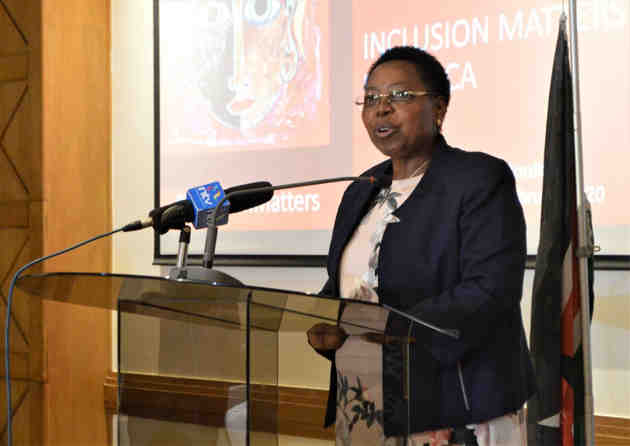STATEMENT ON OBSERVANCE OF THE INTERNATIONAL DAY OF OLDER PERSONS
The National Gender and Equality Commission (NGEC) joins older members of society, Kenya, and the world at large in observing the United Nations International day of Older Persons (UNIDOP). The Commemoration takes place annually on the 1st day of October. The spirit of this day is to raise awareness about issues affecting Older Persons as well as appreciate their contributions toward a sustainable society.
The UNIDOP umbrella theme for 2022 is Resilience of Older Persons in a Changing World and a specific commemoration on the Resilience and Contributions of Older Women. The commemoration serves as a reminder of the critical role of older women in traversing global challenges. It also reminds States to reflect on the innovations, solutions and contributions older women have put forth in addressing contemporary issues.
Disasters and emergencies are key drivers of social and economic stress. In such situations, Older Persons tend to be disproportionately affected because of their biological and social vulnerabilities, their inadequate preparedness and protection mechanisms. The COVID-19 pandemic for example illuminated the vulnerabilities of Older Persons and exposed the failure of response mechanisms. Compared to other groups, Older Persons suffered severe illness and mortality; had challenges in accessing essential services; and suffered irreparable levels of anxiety. The latter was mainly due to isolation and loneliness, loss of income, and lack of adequate support from family and friends, among others.
On a positive note, Older Persons especially women demonstrated immense ability to cope with adversities and build better lives for themselves, their families and communities. In some communities, older women formulated innovative ways to build sustainable resilience to emerging shocks. These range from joining community-based organizations and social groups for social and psychosocial support, to sharing knowledge and skills with younger populations to effectively manage challenges. However, due to existing social inequalities, older women continue to face discrimination as well as negative stereotypes.
Kenya has an elaborate legislative and policy framework that protects and promotes the rights of older women including before, during and after adversities. They include among others, the Mental Health Amendment Act 2022; National Hospital Insurance Fund (Amendment) Act, 2022; National Social Security Fund Act No. 45 of 2013; The Climate Change Act, 2016; National Drought Management Act,2020; National Disaster Risk Management Policy, 2017; and the National Policy on Older Persons and Ageing, 2014. In the last decade, Kenya expanded social safety and protection programs directed at Older Persons. Key among them is the inua jamii flagship program that offers among others the Older Persons Cash Transfer (OPCT) services.
Article 57 of the Constitution of Kenya 2010 requires the State to take measures to ‘ensure the rights of older persons to fully participate in the affairs of society; to pursue their personal development; live with dignity and respect, and be free from abuse, and to receive reasonable care and assistance from their family and the State’. Further, Kenya is a signatory to the Protocol to the African Charter on Human and Peoples’ Rights on the Rights of Older Persons in Africa. The Protocol obligates the State to ensure that in situations of risk, Older Persons are given priority during rescue efforts, settlement, and repatriation. State parties should also ensure that older persons receive humane treatment, protection and respect at all times[1].
Kenya is also a signatory to the Sendai Framework for Disaster Risk Reduction 2015-2030[2] which recognizes that disaster risk management requires an ‘all-of-society engagement and partnership’, and inclusive of the elderly.
Despite the presence of legal, policy frameworks, and increasing investments in programs for older persons, the Commission notes with concern the systematic violation of the rights of older persons and specifically those with disabilities, those living in hard-to-reach areas and informal settlements, and those from marginalized communities. In some parts of Kenya, the Older Persons are killed or exiled over witchcraft claims, they are denied food and financial support, others are denied access to health services, disinheritance and fraudulent loss of property, and forceful disclosure of personal information and data, while older women suffer sexual exploitation and abuse.
The Commission wishes to affirm that the State and family hold the greatest responsibility of protecting Older Persons from any harm, and have the duty to promote their rights. In the context of the drought currently facing 13 counties, the Commission calls upon State and Non-State actors to enhance the resilience of Older Persons including women and protect them from devastating impact. These actors are encouraged to continuously collect age disaggregated data to accurately measure the impact of drought on Older Persons and to inform future drought recovery mechanisms. We further recommend that all actors ensure issues of older women are more visible, planned for, and budgeted for.
In conclusion, it is with great honour and humility that we applaud all older women in Kenya for their contributions in various facets of life. You are our Heroines. We acknowledge that despite their vulnerabilities, older women have a role in our national development. On our part, the Commission is committed to continuing to protect the rights of older members of society.
Thank You
SIGNED
Dr. Joyce M. Mutinda, PhD, EBS
CHAIRPERSON
[1] Protocol to the African Charter on Human and Peoples’ Rights on the Rights of Older Persons in Africa
[2] Sendai Framework for Disaster Risk Reduction 2015 - 2030


Comments